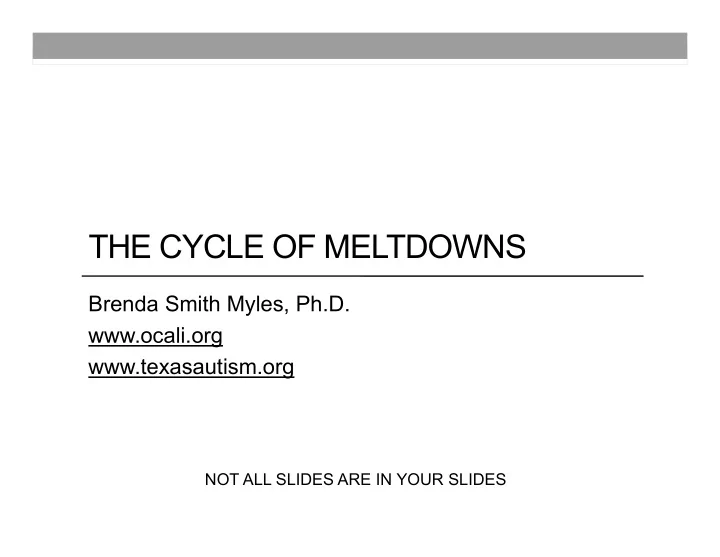

THE CYCLE OF MELTDOWNS Brenda Smith Myles, Ph.D. www.ocali.org www.texasautism.org NOT ALL SLIDES ARE IN YOUR SLIDES
EXCERPTS FROM 22 PEOPLE WITH AUTISM ANSWER THE QUESTION, “WHAT’S IT LIKE?” The Mighty Rachel Kassenbrock August 22, 2015 http://themighty.com/2015/08/22-people-with-autism-answer-the- ...utm_medium=social&utm_source=facebook.com&utm_campaign=buffer
SOMETIMES [IT’S] AWESOME, OTHER TIMES IT’S NOT.
IT’S NORMAL EXCEPT FOR THE LACK OF FRIENDS.
YOU’RE ALWAYS AWARE OF WHAT ALL YOUR SENSES ARE DETECTING.
THE ANXIETY CAN BE INSANE AND OVERPOWERING.
IMAGINE BEING IN THE TV SECTION OF [SOGO HONG KONG] AND THERE ARE AROUND 20 TVS ON THE WALL.
IT CAN BE OVERWHELMING SOMETIMES, BUT IT’S NOT UNBEARABLE ONCE YOU FIND A SUPPORT SYSTEM …
I’M A HUGE FAN OF ROUTINE. I LIKE BEING ABLE TO STICK TO A SCHEDULE …
AUTISTS ARE THE ULTIMATE SQUARE PEGS, AND THE PROBLEMS WITH POUNDING A SQUARE PEG INTO A ROUND HOLE IS NOT THAT THE HAMMERING IS HARD WORK. IT’S THAT YOU ARE DESTROYING THE PEG. PAUL COLLINS
CONTINUOUS EFFORT – NOT STRENGTH OF INTELLIGENCE – IS THE KEY TO UNLOCKING OUR POTENTIAL. Winston Churchill
85% OF YOUR SOCIAL AND FINANCIAL SUCCESS IN LIFE IS DETERMINED BY YOUR SOCIAL AND COMMUNICATION SKILLS. The Dale Carnegie Foundation
I KNOW OF NO ONE WHO IS PURELY AUTISTIC OR NEUROTYPICAL. EVEN GOD HAS SOME AUTISTIC MOMENTS, WHICH IS WHY THE PLANETS SPIN. Jerry Newport
AND IS SELF-REGULATION IMPORTANT?
The Secret of School Success • “… one of several findings in the growing body of research on “self-regulation” -- people’s ability to stop, think, make a plan and control their impulses. … it turns out that “these are really the same skills you need to do well in school” and potentially in life.” Professor Megan McClelland Oregon State University USA Today, Sept 2, 2009. http://blogs.usatoday.com/oped/2009/09/column-the-secret-of-school-success.html
“ If my child graduates from high school and he cannot read, it would be against the law to discriminate against him. However, if he graduates and is not able to live or work next to other people without hurting or scaring them, society will not tolerate him. As a result, he will most likely lose his freedom to move about his community independently, impacting his long-term quality of life. ” - Quote from “ a very wise parent ” in Using the 5-Point Scale and Anxiety Curve Poster by K. Dunn Buron and M. Curtis (2008) AAPC
It Might Be a Self-Regulation Problem If … • You think that she is just being stubborn. • You think for a nanosecond, “Just calm down already.” • You feel like you need to watch your every word. • You think, “Here we go again.” • You have to stop yourself from wanting to raise your voice. • You have to stop yourself from being in a bad mood around the person.
SOME GUIDELINES From the work of Chris Filler and other OCALI employees
“Give Me Space” • Sensory sensitivities can cause stress and anxiety • Use home base • Attempt to stay back. Move slowly into the person’s space • Ask for permission to touch; do not assume it is OK to even touch lightly • Let the individual choose where to sit stand or pace
“Turn Down the Noise and Lights” • Try to eliminate multiple sounds in the environment • Allow headphones or ear buds • Change or reduce lighting
“Listen or Look for the Message Behind the Behavior” • Consider the hidden message – it could be fear, anxiety, pain, confusion, anger, hunger, and so forth • Respond with a comforting joke, a choice with options or change what you are doing
“Like Me” • Individuals with ASD know if you like them • They may respond accordingly
“Say What You Mean: Communicate Your Message Clearly” • Say what you mean and mean what you say • Be concrete and to the point • Use words that the individual knows, likes, or relates to
“When in Doubt, Write it Out or Use Pictures” • A picture is worth a 1000 words • Use checklists, provide directions, post schedules, post rules in writing • Use a “change card” • Draw – even if you are not an artist
“Let Me Know That Mistakes Are Okay” • Individuals only see the end product • They often don’t understand that mistakes are a part of learning
“Change Your Approach” • Look inwardly. How can you change what you do? • Perhaps • Whisper, slow your words, sing • Stop talking for a bit • Stop moving and keep your hands still • Demonstrate calmness
“Give Me Choices” • Having choices provides control • What they can do • The order in which to do something • When to take a break • What to wear • What to eat
“Be Patient” • Patience communicates respect and caring • Make a statement or ask a question and wait • Honor any attempt – an attempt is not a refusal It is success • Refusal may mean the individual is not ready or does not have the skills • Avoid rushing an gie time
“Don’t Ask Me Why” • Some individuals cannot communicate the why • Provide information about the situation instead of asking for information (use writing or drawing) • Ask questions that offer a choice instead of being open ended
“Honor Special Interests” • Individuals define themselves by their special interests • Build lessons around special interests • Use special interests to help through challenging moments
THE POTENTIAL OF INDIVIDUALS WITH AUTISM IS LIMITLESS!
Recommend
More recommend